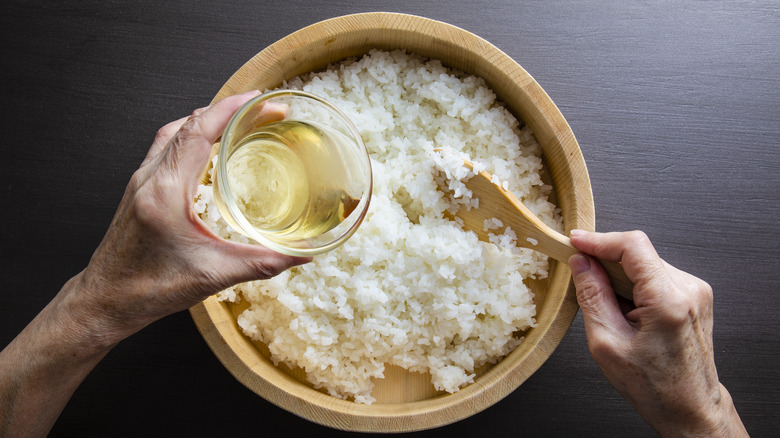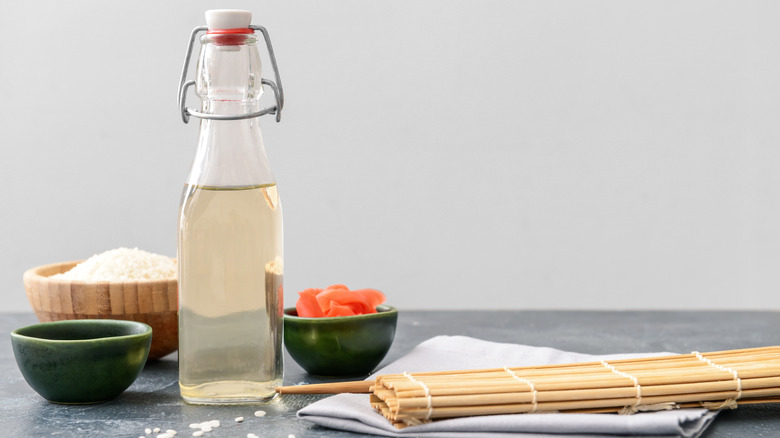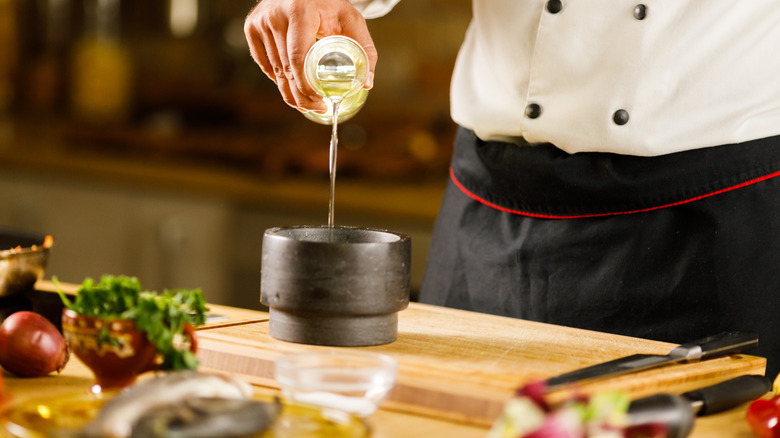No, Rice Wine And Rice Vinegar Are Not Interchangeable
Rice wine and rice vinegar (aka rice wine vinegar — confusing, we know) are extraordinarily useful cooking ingredients, particularly in Asian cuisines. Rice cooking wine has roots in Japan, where it's called mirin, and China — there, known as shaoxing — among other places. Despite their similar names, which signify their common source, rice wine and rice vinegar are not interchangeable. While rice wine is the slightly sweet, boozy result of the starch being steamed, converted to sugars by koji mold, and yeast fermented, rice vinegar is the acidic byproduct of that fermentation, giving the two vastly different flavors and uses.
The similar labels may tempt you into using one in place of the other, but you don't want to have the wrong thing in hand, so it's good to triple-check the label before you tip it into your dish. If you do find yourself without the one your recipe calls for, you're better off substituting rice wine with a white wine, dry sherry, or gin and rice vinegar with apple cider vinegar.
The difference between wine and vinegar comes down to acidity
Despite the name, rice wine vinegar contains no alcohol, and is made by fermenting rice with acetic acid bacteria and a small amount of rice wine. These substances help convert the rice's natural sugars to alcohol and then to acetic acid. The process yields a tart, mildly sweet, and highly acidic vinegar, sitting between a 2 and 3 on the pH scale. Another reason the two are mixed up (even after a smell test) is they are both acidic ingredients, though rice wine is quite a bit less so, around 3 to 5 pH.
Even though rice wine vinegar is more acidic than rice wine, it is still much less acidic and intense in flavor than other vinegar varieties, including distilled white vinegar, red wine, and other vinegars sourced from grapes. MasterClass describes the flavor spectrum of rice wine vinegar as going "from delicate and understated to sweet and floral." It provides the essential acidic component to foods without overpowering them. Rice wine shares similar mildly sweet and tart qualities, but to a much more subtle extent.
Cooking with vinegar v. cooking with wine
The difference in acidity between rice wine and rice wine vinegar impacts their flavors and how the two interact with other ingredients. For instance, it's rice wine vinegar that makes rice fluffy for dishes like sushi, as its acidity breaks down the layer of starch on the surface of cooked rice, congealing it. The vinegar leads the grains to stick to one another and becomes perfect for soaking up whatever sauces you'd like to pair with it.
Rice wine is not nearly acidic enough to have the same effect, but the bitter notes of alcohol help create a more complex flavor profile in cooking. Its more neutral flavor is great for building sauces, in particular. In Chinese cooking, it's common to use rice wine to deglaze woks to help release the flavors of caramelized bits of food stuck to the pan. The wok quickly cooks off the alcohol, and melds with the fond, adding a new depth to the entire dish.
Other versions of rice wine are quality enough for drinking; and, as any chef will tell you, if it's good for drinking, it's great for cooking. Sake, for example, is a rice wine that has long been enjoyed in Japan and beyond.


